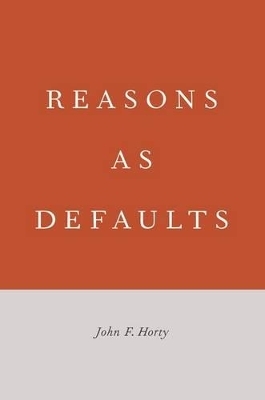
Reasons as Defaults
Oxford University Press Inc (Verlag)
978-0-19-939644-3 (ISBN)
Although the study of reasons plays an important role in both epistemology and moral philosophy, little attention has been devoted to the question of how, exactly, reasons interact to support the actions or conclusions they do. In this book, John F. Horty attempts to answer this question by providing a precise, concrete account of reasons and their interaction, based on the logic of default reasoning. The book begins with an intuitive, accessible introduction to default logic itself, and then argues that this logic can be adapted to serve as a foundation for a concrete theory of reasons. Horty then shows that the resulting theory helps to explain how the interplay among reasons can determine what we ought to do by developing two different deontic logics, capturing two different intuitions about moral conflicts.
In the central part of the book, Horty elaborates the basic theory to account for reasoning about the strength of our own reasons, and also about the related concepts of undercutting defeaters and exclusionary reasons. The theory is illustrated with an application to particularist arguments concerning the role of principles in moral theory.
The book concludes by introducing a pair of issues new to the philosophical literature: the problem of determining the epistemic status of conclusions supported by separate but conflicting reasons, and the problem of drawing conclusions from sets of reasons that can vary arbitrarily in strength, or importance.
John Horty is Professor of Philosophy, University of Maryland. He is the author of Agency and Deontic Logic and Frege on Definitions.
Introduction ; I Default logic ; 1 A Primer on Default Logic ; 1.1 Basic concepts ; 1.1.1 Default rules ; 1.1.2 Priority relations ; 1.1.3 Theories and scenarios ; 1.2 Central definitions ; 1.2.1 Binding defaults ; 1.2.2 Proper scenarios and extensions ; 1.3 Extensions and conclusions ; 1.3.1 Theories with multiple extensions ; 1.3.2 Theories without extensions ; 2 From Defaults to Reasons ; 2.1 An austere theory of reasons ; 2.2 Developing the theory ; 2.2.1 Conflict, strength, and defeat ; 2.2.2 Reasons and enablers ; 2.2.3 Reason amalgamation ; II Deontic Logic ; 3 Reasons and Oughts ; 3.1 The two logics ; 3.1.1 Simple oughts ; 3.1.2 Conditional oughts ; 3.1.3 Some history ; 3.2 Properties of the logics ; 4 Moral Conflicts ; 4.1 Logical objections ; 4.1.1 Agglomeration ; 4.1.2 Other logical objections ; 4.2 Conceptual objections ; 4.3 Objections based on reasons as moral forces ; III Some Elaborations ; 5 Variable Priorities and Exclusion ; 5.1 Variable priority default theories ; 5.1.1 The definition ; 5.1.2 Some examples ; 5.2 Exclusionary default theories ; 5.2.1 The definition ; 5.2.2 Some examples ; 5.3 Discussion ; 5.3.1 Downward closure of exclusion ; 5.3.2 Exclusion by weaker defaults ; 5.3.3 Excluders, intensifiers, and attenuators ; 6 Particularism ; 6.1 Dancy's argument ; 6.2 Evaluating the argument ; 6.3 Discussion ; 6.3.1 Pragmatic considerations ; 6.3.2 Borrowing a book ; 6.3.3 Moderate particularism ; IV Some complications ; 7 Skepticism and Floating Conclusions ; 7.1 Floating conclusions ; 7.1.1 Arguments and paths ; 7.1.2 Two versions of skepticism ; 7.2 The problem with floating conclusions ; 7.2.1 An example ; 7.2.2 Objections to the example ; 7.3 Discussion ; 7.3.1 Other examples ; 7.3.2 Skepticism ; 8 Problems with Priorities ; 8.1 Refining the concept of defeat ; 8.2 Controlling the order of application ; 8.3 Discussion ; 8.3.1 Inappropriate equilibria ; 8.3.2 Other orderings ; 8.3.3 Reinstatement ; V Appendices ; A Notes on the default logics ; A.1 Proper scenarios ; A.2 Some observations on defeat ; A.3 Normal default theories ; B Notes on the deontic logics ; B.1 A comparison with van Fraassen's logic ; B.2 A comparison with standard deontic logic
| Zusatzinfo | 29 illustrations |
|---|---|
| Verlagsort | New York |
| Sprache | englisch |
| Maße | 155 x 231 mm |
| Gewicht | 399 g |
| Themenwelt | Geisteswissenschaften ► Philosophie ► Erkenntnistheorie / Wissenschaftstheorie |
| Geisteswissenschaften ► Philosophie ► Ethik | |
| Geisteswissenschaften ► Philosophie ► Logik | |
| ISBN-10 | 0-19-939644-2 / 0199396442 |
| ISBN-13 | 978-0-19-939644-3 / 9780199396443 |
| Zustand | Neuware |
| Haben Sie eine Frage zum Produkt? |
aus dem Bereich


